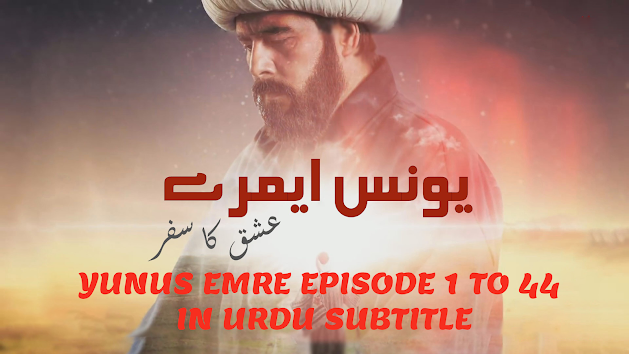 |
| Yunus Emre Episode 1 to 44 in Urdu Subtitle |
| Yunus Emre All Episodes | Author |
|---|---|
Mohammad Noman Jehangir Butt | |
Mohammad Noman Jehangir Butt | |
| Mohammad Noman Jehangir Butt | |
Mohammad Noman Jehangir Butt | |
Mohammad Noman Jehangir Butt | |
Mohammad Noman Jehangir Butt | |
Mohammad Noman Jehangir Butt | |
Mohammad Noman Jehangir Butt | |
Mohammad Noman Jehangir Butt | |
Mohammad Noman Jehangir Butt | |
Mohammad Noman Jehangir Butt | |
Mohammad Noman Jehangir Butt | |
Mohammad Noman Jehangir Butt | |
Mohammad Noman Jehangir Butt | |
Mohammad Noman Jehangir Butt | |
Mohammad Noman Jehangir Butt | |
Mohammad Noman Jehangir Butt | |
Mohammad Noman Jehangir Butt | |
Mohammad Noman Jehangir Butt | |
Mohammad Noman Jehangir Butt | |
Mohammad Noman Jehangir Butt | |
Mohammad Noman Jehangir Butt | |
Mohammad Noman Jehangir Butt | |
Mohammad Noman Jehangir Butt | |
Mohammad Noman Jehangir Butt | |
Mohammad Noman Jehangir Butt | |
Mohammad Noman Jehangir Butt | |
Mohammad Noman Jehangir Butt | |
Mohammad Noman Jehangir Butt | |
Mohammad Noman Jehangir Butt | |
Mohammad Noman Jehangir Butt | |
Mohammad Noman Jehangir Butt | |
Mohammad Noman Jehangir Butt | |
Mohammad Noman Jehangir Butt | |
Mohammad Noman Jehangir Butt | |
Mohammad Noman Jehangir Butt | |
Mohammad Noman Jehangir Butt | |
Mohammad Noman Jehangir Butt | |
Mohammad Noman Jehangir Butt | |
Mohammad Noman Jehangir Butt | |
Mohammad Noman Jehangir Butt | |
Mohammad Noman Jehangir Butt | |
Mohammad Noman Jehangir Butt | |
Mohammad Noman Jehangir Butt |
Yunus Emre Episode 1 to 44 in Urdu Subtitle
It is the fourteenth century that the leftovers of the Seljuks controlled Anatolia under the title of Seljuk Rome. As the Crusaders sat on their northern outskirt, Baghdad in the east was assaulted by the Tartars, including the Caliph. Subsequently, the force and wonder of the Muslims and the greatness of the Muslim proclamations had been restricted to the main stories.
At the base of the position of authority was the religious community of Maulana Jalaluddin Rumi, where, paying little mind to the conditions around him, consistently there was a get-together of insight, the quiet bosoms of contemplation, the entryway and divider trembled with the reverberation of recognition, and afterward the fire of affection developed in the move. Used to get up Yunus Emre, known as Rumi II, was nauseated with Sufism. In Konya, he gave himself to taking care of the issues of information and understanding the issues of Sharia. Subsequent to moving on from the madrassa, he was given the post of judge and sent to a rural town a long way from Konya. In the city of Panah, an adjudicator who had fled from Sufism and was not impacted by Rumi, however a Sufi shepherd in the mountains, went gaga for Taptak Emre.
Prior, Tapak Emre used to pursue Yunus and now Yunus Tapak began pursuing Emera so that when he saw it, he became Yunus Emre from Yunus. In any case, he turned down the Qaza and turned into a Sufi, and afterward he started to change the useful tidbits into verse. It is said that Rumi and Yunus Emre were two travelers of a similar pontoon, however the main contrast between the two was the style of compromise. The Romans embraced the Persian language predominant in the Turkish world class, and the Emeralds were spoken in antiquated Turkey, spoken in the fields. Along these lines, while Rumi's way of thinking before long spread from the court of Konya to Iran and India, the delights and distresses of the Gypsies of Emre turned out to be a piece of it. Almost 900 years have spent today and that is actually what occurred.
The famous arrangement "Yunus Emre" on the Turkish state channel is an appearance of the long and solid association between Turkish Islamic supernatural quality, other worldliness and society tunes. While the play covers the life of Yunus Emre, its topic appears to rotate around the old discussion between Shari'a, Tareeqah, Haqqat and Merefat. All things considered, in what capacity can an adjudicator who trusts in appearances leave his official position and agreeable life and go to the Dargah? All things considered, what is the purpose of a man who remembers books being heard saying 'I don't have the foggiest idea' on each question? What are the conditions wherein a scholarly individual who considers verse as misguidance composes a tribute of Jang-e-Qaws-e-Dag.


No comments:
Post a Comment